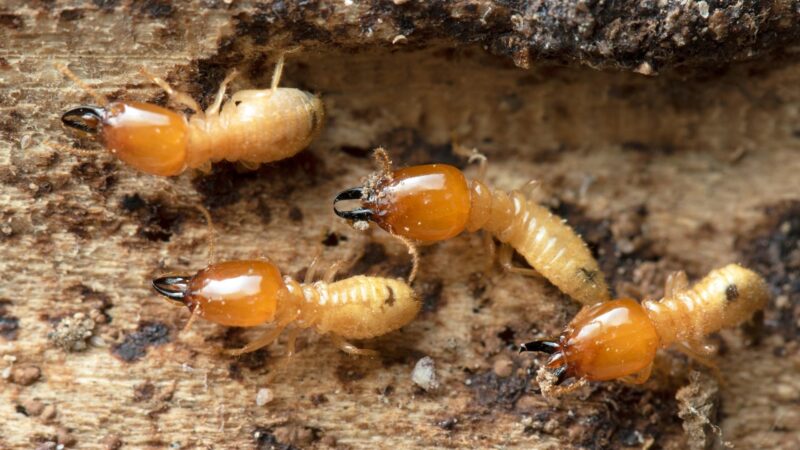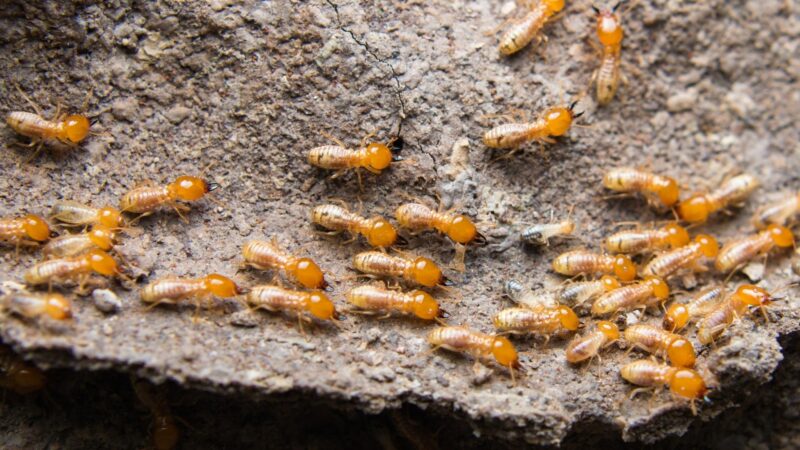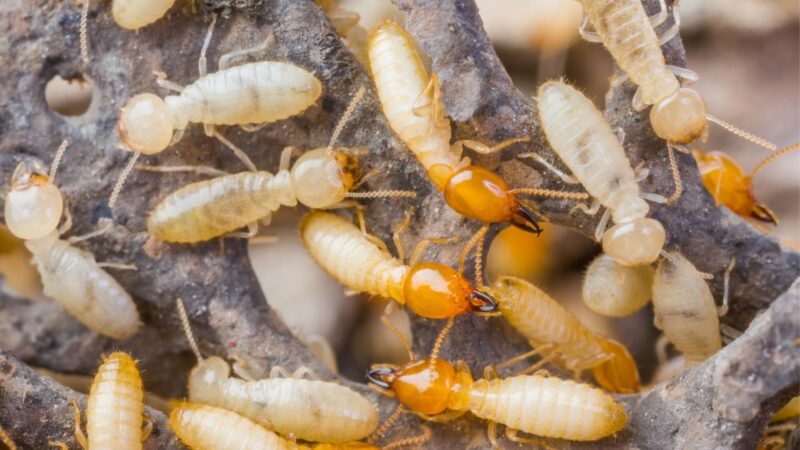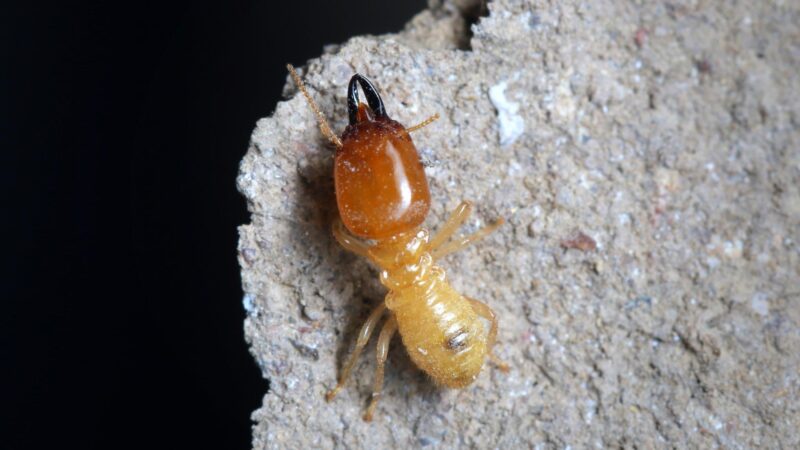When you’re into gardening, you work hard for it and even protect them from pests. You may or may not be surprised when you see termites damaging and eating your plants.
Despite their reputation for damaging wooden structures that are worth billions of dollars, they can cause disturbance in any urban space.
How to get rid of termites in the yard? Liquid termiticides are a thing of the past, as baiting is the new way of getting rid of termites in your yard. Still, you can use the former. You may also use nematodes that kill insects. Nematodes are considered natural insecticides, but you have to make sure that you get the type that is compatible with your soil.
You can’t just spray insecticide and expect that the termites are eradicated. Those that you see on the surface may perish, but you don’t completely get rid of the colony.
Others go on with their lives underground and emerge to surprise you. To know the details on the proper and effective ways to eliminate termites in your yard, read on!
Table of Contents
Should You Be Worried About Termites in the Yard?

You should be worried about termites in your yard, especially if you have a garden filled with plants. There’s a study that focused on the injuries of maize and baby corn raised in conventional and organic farming in Kenya. They lodge the plants and make tunnels on the stems.
Some may think that these are the doings of the ants, but termites are capable of doing these things. It’s also mentioned that they can damage different kinds of trees and plants from seeds to their mature form.
Apart from lodging, they also consume plant roots. Therefore, they cause problems in agriculture and forestry.
Is It Normal to Have Termites in Your Yard?
It is normal to have termites in your yard, as some species thrive in the soil moisture.
While it’s true that they can munch on wood, cardboard, paper, and other cellulose items, the tunneling ability of subterranean termites include penetrating electric cable composed of lead and plastic.
These termites may live in a tree stump, and they work all their way to the cracks of your walls and floors. They venture this way to search for food in the interior of houses and buildings.
How Do I Know if My Yard Has Termites?

You’ll know that you have termites in your yard once you see swarmers or termites with wings during the time. Consider it as a way of nature telling you that there’s a termite colony close by.
The colony may be in an underground nest, landscape timbers, or a tree stump.
What Attracts Termites in Your Yard?
Termites are attracted to moist soil in your yard as they can gain several benefits from it. First, they can make a passageway to go to the food sources as air exposure is not good for them.
The passage or tunnel that they make protects them from predators as well. They also use moist soil to build their shelter above the ground.
Signs of Termites in Your Yard

Here are the signs, so you will know that you have termites in your yard:
Swarm of Winged Termites
Without a doubt, the obvious sign is when winged termites swarm all over the soil. It’s a sign that there’s a colony that exists nearby.
Tunnels
Since termites have to protect themselves from the drying effect of being exposed to air, they create tunnels that are quarter or half an inch wide. These are the passageways that termites create, so they can travel from soil to wood or other structure and vice versa. To confirm the active infestation, you can break the tunnels to see if there are termites.
Damage to Trees and Plants
When termites attack the bark of the tree, the surface turns dry and hard. They damage the nest and roots of your plants, but they don’t do it on flowers and leaves.
Do Termites Go Away on Their Own?

The swarmers go away on their own as they’re exposed to open areas most of the time. But those who dwell underground need to be eradicated.
How Do I Kill Termites in My Yard?
You can use liquid termiticides as it kills termites in your yard through a single contact. Get Bayer Premise 2 Termiticide or Bioadvanced Termite Killer Plus for the desired result.
What Kills Termites Instantly?
Based on the study conducted at the University of California Riverside, the tandem of heat and essential oils can instantly kill termites. The researchers heat a house with propane heaters to 134 to 146 degrees Fahrenheit. It lasted for 2 hours and 20 minutes, and they found that 92% to 100% of the termites died.
Some blocks don’t have the wintergreen essential oil. It came out that they have a low mortality rate which is only 36% to 44%. Therefore, the essential oil is vital in killing termites.
The efficacy of the substance is relevant since you can’t use heat in all areas, like wooden parts. Another study discovered that clove buds can kill termites in a matter of two days.
How to Get Rid of Termites in Your Yard Naturally?
You can get rid of termites in your yard by nematodes. You won’t worry about anything when using nematodes since they’re safe for humans, as well as non-targeted animals and plants.
There are numerous advantages such as ease of use, quick result, and effectiveness until all the termites are gone.
Nematodes don’t only kill termites but other pests found in soil. To obtain the results, see to it that you execute these steps.
- There are different kinds of nematodes, and you have to pick one that is suitable for your soil type. Some nematodes are effective on undisturbed soil, while other types are great for cultivated land. Species that belong to the same genus may have different effects. For instance, S. carpocapsae works wonderfully with sandy soil while feltiae is best applied in silt or clay.
- UV rays and desiccation can’t get in the way of nematodes, so the application should be done early morning or during sunset.
- Applying nematodes should be done in soil with a temperature of 45° to 95° F.
- The soil should be moist, so you need to water it before and after application, but soaking is not necessary.
- It’s not advisable to apply fertilizer two weeks before and after nematode application. A high amount of nitrogen can diminish the nematode’s efficacy.
- Once you receive the nematodes, it’s best to use them right away. You can store it in the refrigerator but only for two weeks.
How Long Does It Take To Get Rid of Termites?
Another way to get rid of termites is baiting. It’s like a food that is cellulose-based and filled with a substance that can gradually kill termites.
You can put it under the ground or in a plastic station. While the termites forage, they can eat the bait. It would usually take months to see the result.
However, the period needed to obtain the result of baiting varies. It depends on the number, size, and foraging ferocity of a termite colony. Nevertheless, expect low efficacy during late fall and winter, as well as periods of drought. You can choose from effective baits from Trelona, Spectracide, and BASF.
If you opt for liquid termiticide in getting rid of termites, you have to give it at least five years. However, it’s not the same for every residence.
It’s due to the different densities of the colony, environment condition, product, and thoroughness of application.
How to Prevent Termites in Your Yard?
There are barriers that you can use to prevent termites in your yard, and they’re listed below.
- Copper termite shield – This shield is usually installed on the top of the stem wall or foundation.
- Stainless steel mesh – Termi-Mesh is a producer of this mesh that doesn’t let the termites pass through. You can wrap this mesh around pipe protrusions and stem walls.
- Sand – Researchers found out that sand formed into layers of 4” to 6” can deter termites from getting into your yard. You can put it under the foundational concrete so termites won’t be able to create tunnels.
What Do Termites Hate?
- Borates – Termites hate this active ingredient because it stops them from absorbing nutrients. It causes starvation which leads to death.
- Sunlight – Exposure to sunlight and heat will toast termites. Thus, you can put your furniture under the sun when you suspect there are termites around.
- Essential oils – As mentioned, termites succumb to essential oils like wintergreen and clove bud.
Can I Treat Termites Myself?
You can do it yourself by using DIY treatments like setting up bait and applying nematodes. It’s not advisable if the infestation is indoors.
How Likely Are Termites to Return After Treatment?
Sadly, termites can return after treatment as they are living creatures that continue to reproduce. It can still happen even though the best treatment is applied by the most experienced pest controller. Termites can find their way through gaps that are exempted from treatment.
How to Make Sure Our Termites Don’t Come Back?
Termites can still enter your property despite control treatments after they find a safe passage. This reason needs hiring conscientious and experienced pest technicians to return to your property for follow-up treatment.
The service that they provide should have a warranty, so they can treat your yard whenever it’s necessary.
Summary
Getting rid of termites in the yard is challenging as it takes time and follow-up treatment. If possible, don’t allow the soil in your yard to be moist most of the time. Moist soil attracts termites and allows them to build tunnels.
You can also add barriers to the prevention of their entry. If you can’t deal with this pest by yourself, you can always turn to a professional pest controller for help. Make sure you choose a dependable firm.
List of Sources
Termite Baits: A Guide for Homeowners
Termite Treatment in Organic Gardens
Termites Can’t Hide From Heat and Essential Oils, Finds Ucce Study